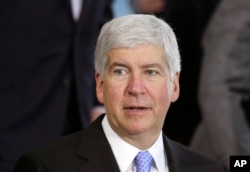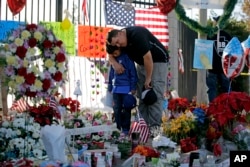The two Democratic candidates for the U.S. presidential nomination, Hillary Clinton and Bernie Sanders, said Sunday they would look forward to running against Donald Trump in the general election.
In Flint, Michigan, the two Democrats also sought to contrast their debates with those in the Republican race that have often featured personal attacks. Sanders said the Republicans are demonstrating why his administration would place a priority on investing in mental health.
Flint's 100,000 residents, most of them black and many of them impoverished, have been facing a toxic water crisis that federal, state and local officials have been grappling with for months.
Sanders opened the debate, broadcast on CNN, by saying he was "shattered" by the sight of families, including children, being "poisoned" by the toxic water in Flint. He called the situation a "disgrace," and said it points out the need to rebuild America's crumbling infrastructure.
WATCH: Clinton, Sanders Face Off in Flint, Michigan
Clinton called on the federal and state governments to funnel more money into Flint to fix the water system. She said nothing is more important than the health and well-being of the people of Flint.
Both candidates called on the Republican governor of Michigan, Rick Snyder, to resign. Snyder later tweeted, "In a few days, political candidates will be leaving Flint and Michigan. I am committed to the people of Flint."
The governor has apologized to Flint residents, who have been dealing with high levels of lead in their water supply for nearly two years.
Who's to blame for water crisis?
Snyder said state and federal environmental agencies failed to identify and solve the problem after it emerged in April 2014, and that he has replaced the state officials with people who understand the severity of the situation.
The water crisis emerged as Michigan state officials, managing the financially troubled city's affairs, tried to save money by switching the water supply in April 2014 from Lake Huron, via the Detroit water system, to the Flint River, which courses through Flint. The city switched back to the Detroit supply last October as the scope of the crisis became apparent.
Trade
On the economy, Sanders accused Clinton of supporting "disastrous trade agreements" such as the North American Free Trade Agreement and normalizing trade relations with China that he said have led to job losses.
Sanders spoke after Clinton discussed a number of ways to help manufacturing jobs. She said there needs to be both "carrots and sticks" so that manufacturers make investments in the U.S.
She also said the country needs a comprehensive plan for manufacturing and improving roads and bridges.
Mass US shootings
The two candidates were asked what they would do to address the epidemic of mass shootings in the United States.
Both called for expanding and improving background checks for those who purchase firearms. But they disagreed on whether gun manufacturers should be held accountable for mass shootings committed by people who use those firearms.
Clinton favors such accountability, while Sanders said Clinton's approach could amount to "ending gun manufacturing in America."
Michigan primary
The Democratic candidates faced off just two days before Michigan's primary, in a city that already was in tough shape long before residents learned their drinking water was tainted with lead.
With Clinton continuing to widen her considerable lead in the Democratic delegate count, Sanders sees upcoming Midwestern primaries as a crucial opportunity to slow her momentum by highlighting his trade policies. After Michigan's vote on Tuesday, the March 15 primaries include Ohio, Illinois and Missouri.
Sanders, interviewed Sunday on CNN's "State of the Union," pledged to keep his campaign going to the Democratic convention this July even if Clinton already has clinched enough delegates to claim the nomination. Sanders did beat Clinton in Sunday's caucuses in Maine.
Clinton has at least 1,123 delegates to Sanders' 484, including super delegates - members of Congress, governors and party officials who can support the candidate of their choice. It takes 2,383 delegates to win the nomination.









